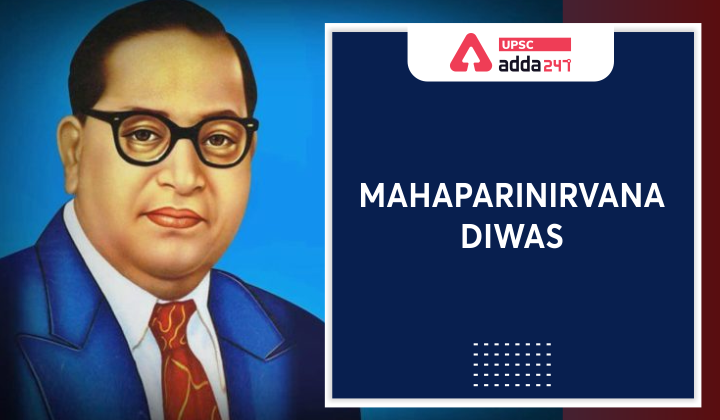Table of Contents
Mahaparinirvana Diwas- Relevance for UPSC Exam
- GS Paper 1: Indian History: Modern Indian history from about the middle of the eighteenth century until the present- significant events, personalities, issues.
Mahaparinirvana Diwas- Context
- Recently, ‘Mahaparinirvana Diwas’ was observed nationwide on the 66th death Anniversary of Dr. Bhim Rao Ambedkar (BR Ambedkar).
The Editorial Analysis- The Need to Reopen Anganwadis
Mahaparinirvana Diwas
- About: Mahaparinirvan Diwas on December 6, 2021, as part of the major commemoration of ‘Azadi Ka Amrit Mahotsav’.
- Key Activities
- Ambedkar Foundation displayed a documentary film highlighting the importance of Panchtirthas, associated with Baba Saheb.
- A special book named “Social Justice and Empowerment: Reflections from Dr. Ambedkar Chairs” was launched by the Minister of Social Justice and Empowerment.
- A brochure was released on Ambedkar’s Panchteerthas and schemes and scholarships for Scheduled Caste students by the Ministry of Social Justice and Empowerment.
- ‘Shreshtha Yojna’ and National Fellowship Management and Grievance redressal portal was also launched.
- Shreshtha Yojna: It will aid socio-economic upliftment and overall development of the Scheduled Castes students by providing quality residential education in reputed private schools.
- National Fellowship Management and Grievance redressal Portal: It was launched with a view to enabling an area-based development approach. The initiative aims at integrated development of Scheduled Castes majority villages.
Raja Ram Mohan Roy- Indian Social Reformer
Mahaparinirvana Diwas- Key Points about Dr. BR Ambedkar
- About: BR Ambedkar was an Indian philosopher, political leader, writer, economist, socio-religious reformer and best known as one of the main architects of the Indian Constitution.
- He is popularly known as Babasaheb Ambedkar.
- BR Ambedkar faced many injustices and discrimination in society as he was born in a caste that was considered untouchable in contemporary society.
- His work was centered around eliminating the caste-based discriminations in society and motivated the Dalits to organize and demand their rights.
- Birth and Death: Babasaheb Ambedkar was born on 14 April 1891 in Madhya Pradesh in Hindu Mahar Caste.
- Babasaheb Ambedkar died on 6 December 1956 in Delhi, India.
- BR Ambedkar Education: He was an economist and had doctoral degrees in economics from Columbia University and the London School of Economics.
- Important works of BR Ambedkar: Mook Nayak (weekly) 1920; Janta (weekly) 1930; The Annihilation of Caste 1936; Pakistan or the Partition of India; ‘Buddha and His Dharma’; The Untouchables 1948; Buddha or Karl Marx 1956, etc.
- Other Key Facts:
- ‘Bahishkrit Hitkarini Sabha (Outcastes Welfare Association)’ was launched by BR Ambedkar in 1923 for spreading education and culture amongst the downtrodden.
- Ambedkar attended all the three Round Table Conferences (1930-32) in London representing the interests of the Untouchables of the Indian Society.
- Ambedkar became the first Law Minister in 1947 under the Congress-led government.
- BR Ambedkar was appointed as a member of the Rajya Sabha in 1952 and remained a member till his death.
- BR Ambedkar was bestowed with Bharat Ratna in 1990.




 TSPSC Group 1 Question Paper 2024, Downl...
TSPSC Group 1 Question Paper 2024, Downl...
 TSPSC Group 1 Answer key 2024 Out, Downl...
TSPSC Group 1 Answer key 2024 Out, Downl...
 UPSC Prelims 2024 Question Paper, Downlo...
UPSC Prelims 2024 Question Paper, Downlo...





